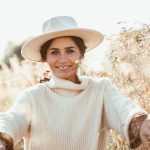Refugee Health
- Refugee Health Home
- About
- Statistics
- Stories from Minnesota Refugees
- Refugee Health Assessment Coordination
- For Resettlement Agencies
- For LPH and Health Care Providers
- For Community Sponsors
- Directories for Organizations Serving Diverse Communities
- Health Education Materials
- Trainings and Events
- Center of Excellence in Newcomer Health
Spotlight
Refugee Health
- Refugee Health Home
- About
- Statistics
- Stories from Minnesota Refugees
- Refugee Health Assessment Coordination
- For Resettlement Agencies
- For LPH and Health Care Providers
- For Community Sponsors
- Directories for Organizations Serving Diverse Communities
- Health Education Materials
- Trainings and Events
- Center of Excellence in Newcomer Health
Spotlight
Stories from Minnesota Refugees
In honor of World Refugee Day, join us in celebrating and amplifying the voices of Minnesota’s refugees.
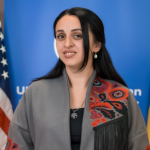
Iryna Borbol
Ukrainian refugee, family educational mentor at Ukrainian American Community Center
Iryna Borbol arrived in Minnesota with her two young children in 2022, fleeing the war in Ukraine with hope in her heart and uncertainty ahead. Like many refugee mothers, she believed the war would soon end and she would return home—but instead, Minnesota became her second home. Today, Iryna serves as a family educational mentor at the Ukrainian American Community Center, where she supports children and youth from newly arrived families, ages 4 to 24, as they adapt to life in a new country. She helps them navigate cultural and educational systems, build confidence, and achieve their educational, behavioral, and social goals. Her work is not just professional—it’s deeply personal. In 2024, Iryna welcomed her third child, a daughter born here in the U.S. That life-changing moment strengthened her bond with the community and reaffirmed her mission: to give others the care, understanding, and guidance she once needed herself.
To me, health means more than just physical well-being — it means feeling safe, emotionally supported, and hopeful. It means being able to care for your children and yourself without fear and knowing that someone has your back in difficult times.
When I arrived, I was overwhelmed and afraid — I didn’t understand how the health care system worked, and I was expecting a baby with no savings and no insurance. I didn’t know if I could afford to give birth, let alone safely. But Minnesota embraced me. I received high-quality prenatal care, a safe C-section delivery, and all the follow-up care I needed. I was deeply moved by how much the state cares for women, for children, and for birth itself. Children are a priority here, and that support gave me dignity, relief, and peace of mind. I will never forget it.
My community uplifts me. At the Ukrainian American Community Center, we host free health days with dental checkups, vision screenings, and educational workshops. But beyond that, we create space for joy, connection, and healing — through cultural events, children’s programs, and gatherings where no one feels alone. For many, including me, these moments reduce stress, ease anxiety, and bring back a sense of normal life.
I offer my heart, my time, and my voice. Through my work, I support refugee families in accessing health care, education, and emotional support. I guide them step by step, especially the mothers — because I know how it feels to be one of them. I help them believe they can thrive again.
I dream of peace in Ukraine — of the day we can return, not to ruins, but to hope. I dream that my children, and all our children, will grow up safe, healthy, and free. And here in Minnesota, I hope to continue walking beside new families, helping them rebuild their lives with strength, dignity, and love.
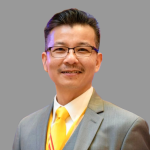
Tri Tang
Vietnamese refugee, community leader, Vietnamese Community of Minnesota president
Tri Tang came to Minnesota with his family in 1994, reuniting with his father, who had escaped Vietnam by boat. They fled Vietnam due to challenges that followed the fall of Saigon in 1975 - the end of the Vietnam War. Community, togetherness, and heritage are important to Tri. As president of the Vietnamese Community of Minnesota, he is an advocate who leads collaborative events that bring the community together and preserve Vietnamese culture. In 2001, Tri earned a degree in mathematics from the University of Minnesota and now uses his education as an insurance agent, serving the needs of the Vietnamese community.
To me, health is a multifaceted concept that encompasses physical, mental, and emotional well-being. It's about nurturing my body, mind, and spirit to live a balanced and fulfilling life.
For Vietnamese Americans, we commemorate the 50th anniversary of the fall of Saigon, marking the end of the Vietnam War. We honor the resilience and sacrifices of those who lived through this pivotal event. This milestone serves as a poignant reminder of their heritage, allowing them to connect with their roots, acknowledge their ancestors' experiences, and express gratitude for the opportunities afforded to them in their adopted homeland.
Minnesota's natural beauty, outdoor recreational opportunities, and strong community spirit make it a great place to call home. As refugees, not just Minnesota, the United States of America is the best place to live with freedom and opportunities.
Through various activities, events and social connections, my community helps me stay engaged, active and motivated to prioritize my health. Our first Lunar New Year's event at Burnsville Mall in 2024 was a resounding success, attracting approximately 20,000 attendees. This year, in 2025, we saw an increase in attendance, with around 25,000 people joining us. This event brought together various organizations, including churches, Vietnamese schools, and veteran groups, demonstrating the power of community unity.
After residing in the United States for over 30 years, I'm eager to give back to our community. As president of the Vietnamese Community of Minnesota, my objective is to unite the Vietnamese community in Minnesota to create a stronger and more vibrant community for all. I created healthy events for our communities. We organize various events that celebrate our culture and heritage. One of our flagship events is the Lunar New Year's celebration, sports (tennis tournament, pickleball tournament), karaoke contests, and summer festivals.
These events aim to bridge the gap between younger and older generations, fostering understanding and connections among community members. By collaborating with organizations like the Vietnamese Student Association, Vietnamese schools, churches, and others, we have been able to build a strong and cohesive community. Through these collective efforts, we have achieved significant success in promoting unity and cultural heritage among Vietnamese Minnesotans.
That's a great and big question. I hope for peace and understanding among communities and nations and advancement in technology that improves quality of life. I am Vietnamese-American. I have a healthy and successful life. I have everything that I need. But I hope our younger generation will have a better and healthier life in this beautiful country.
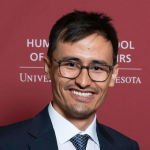
Mahdi Surosh
Afghan refugee, project manager at Center for Victims of Torture
Mahdi Surosh arrived in Minnesota just days before the fall of Kabul in August 2021, as a Fulbright Scholar, and went on to earn a Master of Public Policy from the Humphrey School of Public Affairs at the University of Minnesota–Twin Cities. He also holds a bachelor’s degree in journalism and communications. Since 2012, Mahdi has been deeply involved in civil society, media, and advocacy for human rights, education, and environment. Unable to return to Afghanistan, he has made Minnesota his second home—a place where he continues his mission to give a voice to the vulnerable, stand up for minorities, and support refugee and underserved communities with compassion and commitment. Mahdi Surosh is the project manager of the Raahat project in Minnesota, where he works closely with Afghan refugees to help them rebuild their lives and find a sense of belonging. A native of Afghanistan, Mahdi has dedicated his life to public service and human rights—both back home and now in the United States. Mahdi worked with organizations such as Freedom House, the American Institute of Afghanistan Studies, the Afghan Journalists Safety Committee, Climate Resilience International, and the former Afghan government.
To me, health is everything. It encompasses several aspects of our lives—physical, psychological, emotional, spiritual, professional, and personal—what many call the “Wheel of Life”. I sometimes joke with my friends that when we are physically sick, we suddenly have only one problem, and we will do anything to recover. That is when we truly cherish our physical health and prioritize caring for ourselves and our families.
As refugees who lost everything we built and starting from scratch, we often push ourselves hard to achieve better professional prospects and earn a stable income. But in this race, many of us tend to neglect our mental and emotional health, placing it at the bottom of a long list of competing needs and challenges. I believe it is essential—especially for refugees—to pay attention to all aspects of our well-being, particularly our mental and emotional health. That is what helps us not just survive but truly thrive in the long run.
I came to Minnesota to pursue a master’s degree, not knowing that the Republic of Afghanistan would collapse and I would not be able to return. When things changed back home, I had to reshuffle my thoughts and plans—and I am still figuring things out. Not everything is clear yet, but I am grateful to now call Minnesota my home.
The state offers a quality health care system, beautiful parks, and strong educational opportunities. It is peaceful, and the people are welcoming. I have been fortunate to meet incredible individuals here and to have had meaningful conversations with them.
That said, the winters can sometimes feel long—and I catch myself counting the days until summer. I miss the warm weather, the thousands of lakes, the trails, and especially playing volleyball with my friends. Of course, that is not to say there is no joy in winter—it has its own charm too.
A supportive and understanding community is one of the most valuable assets we can have. I am blessed to have a small circle I can rely on—my community. I believe relationships and social interaction contribute greatly to our overall health and well-being.
Let me share a personal story that highlights the importance of community and a small but meaningful difference between Afghanistan and Minnesota, and how it impacted my health. In Afghanistan, meals are almost always shared—with family, friends, or colleagues. There is always someone to eat with. In Minnesota, that was a little different, particularly if you are a newcomer. When I first arrived, I often ate alone. Though I had classmates, everyone was busy with their own lives. I started to lose my appetite, lost weight, and avoided going out. The food did not even taste the same, and I assumed it was because of the ingredients.
I tried sourcing the same ingredients from international markets, but the taste still did not return. After a few months, I decided to take a bigger step—I began connecting with more people, expanding my circle of friends, and eventually sharing meals again. Slowly, the food began to taste better. I regained some of the weight I had lost, and more importantly, I regained the joy of connection and the confidence to go out and engage with life here. It was through building my small community that I found my footing again.
Professionally, I lead the Raahat Project—meaning ease and comfort in Dari/Farsi and Pashto—at the Center for Victims of Torture (CVT). Through this project, my team and I support Afghan individuals and families—refugees, asylees, and parolees—who have resettled in Minnesota since August 2021 following the collapse of the Afghan Republic.
We provide culturally and linguistically appropriate services in Dari/Farsi, and Pashto. We support adults, youth, and children through mental health services and community activities that help individuals cope with trauma, fear, stress, and other challenges as they navigate their new life. Our work not only supports healing but also lays the foundation for individuals and families to rebuild and thrive.
Since I started this role in the summer of 2023, we have organized a range of programs in the Twin Cities, offering psychotherapy, social work services, and group support. Many of our social support groups include engaging activities to maintain interest and encourage participation. So far, we have offered swimming, cricket, sewing, makeup sessions, financial literacy, and language classes. We have also helped organize large gatherings, like Eid celebrations, where hundreds of Afghan community members came together to share meals and enjoy time with one another.
Personally, I also engage in advocacy for education and human rights in Afghanistan and speak up for refugees, vulnerable groups, and underserved populations here in Minnesota and across the U.S.
I hope to continue doing more—for my first home, Afghanistan; my second home, Minnesota and the U.S.; and for vulnerable and underserved communities around the world. I want to contribute to building a more just and fair society—where everyone, regardless of background, has access to quality education, quality health care, clean environments, basic human rights, affordable housing, and most importantly opportunities to become the best version of themselves. In the future, you will find me in the community fiercely working for these rights and serving wherever I can. I am hopeful, because I believe we are surrounded by passionate individuals who care deeply. As we say in Dari/Farsi: “A good year can be predicted from its spring.” Having people who care today is a blessing—and a promise for an even greater future.
Sani
Ghanaian asylee, Community health worker trainee at CHW Solutions
Sani came to the U.S. in 2020 after he left his home country of Ghana in search of safety and peace. Initially arriving in California, Sani began volunteering for the Minority Humanitarian Foundation in San Diego, the same organization that had originally helped him when he arrived. There, Sani helped other migrants with things like travel coordination, housing, and accessing support. He then moved to Minnesota, where he earned a community health worker degree at St. Mary’s University in 2025. Sani now uses his education and incorporates advocacy in his work as a community health worker trainee at CHW Solutions, where he supports newcomer communities and is an advocate for migrants and mental health.
Health is a major point in our lives as humans; it very important to be mindful of your health as part of your day-to-day activities.
I never regretted being in Minnesota, I lost a home and found a loving and caring community in Minnesota. I feel safe, and I found that peace that I have been always searching for in Minnesota.
I was diagnosed with post-traumatic stress disorder (PTSD) when I got here, but with the help of the beautiful people of Minnesota, my community, and specifically the Center for Victims of Torture, I received the resources that can help stabilize my situation. CVT, where I’m now a board member of the Survivors Advisory Board, has really helped because I was going through a tough time, and never knew I have PTSD. I was diagnosed with PTSD, and they helped me get my health insurance, provide me with bus card and gift card for groceries, and they got me a therapist and a psychiatrist so she can be prescribing medications for me.
My church also plays a vital role in my journey by providing me housing, food and other needs, and also part of navigating my asylum process like following up with my lawyer and making sure all the paperwork is done. One individual connected me to CVT, and now he is my friend and we work together to help other migrants as volunteers.
I am a big advocate of mental health, and I will want to give back to my community as a community health worker, so other immigrants like me can find the peace they deserve.
I would like to get a degree in Social Work, and I also hope to establish my own organization that can help asylum seekers and other immigrants.

Hsa Hser Ku
Karen refugee, community health educator at Karen Organization of Minnesota (KOM)
Hsa Hser Ku is part of the Karen (Kah-ren) ethnic group located in Myanmar (Burma). Her family fled their home country to Thailand due to conflict between the Karen and Burmese people. Hsa Hser was born in the Maw Ker refugee camp in Thailand and came to St. Paul, Minnesota in 2008. Education is important to Hsa Hser. At the refugee camps, she “received limited primary education and educational opportunities.” In 2018, she received a degree in Health Care and Gender Studies. She utilizes her education and passion for helping the Karen community as a Community Health Educator for the Karen Organization of Minnesota.
Health is when a person is physically, mentally, emotionally, spiritually, socially, and financially stable and complete.
Minnesota has healthy home environment supportive systems such as government, community, friends, and family.
Having a community who keeps the culture and tradition alive helps keep my emotional and spiritual health healthy.
As a community health educator, I provide education on mental health and suicide prevention and family planning and assist the community by helping them navigate through the health care and government system.
In the future I want to see the Karen community be more open to seeking mental health help. I want the Karen community to reduce the stigma around talking about mental health and normalize mental health issues. I also wish to see the community seek preventive care and receive more education on different health topics. I would like to see more Karen involvement in the health care field, giving back to the community and offering help to other people. I want to see more health care providers who are Karen and have the passion to help people in need.
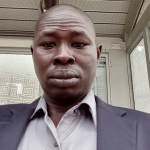
Jima Gai Machar
South Sudanese refugee, community leader
Jima Gai Machar came to Minnesota with his family in 2023. They fled to Kenya due to crises and challenges in their home country of South Sudan. Between 2011 to 2023, Jima and his family resided in the Kakuma refugee camp in Kenya. Community is important to Jima. At the Kenyan refugee camp, he was a community leader. He led collaborative community efforts advocating for child protection, managed cases in suicide prevention, and counseled married couples. Jima utilizes his passion for bettering his community to help those in need both locally and abroad.
The times that I was in Africa, I didn’t work by my home. When I came to the United States, I work by my home, so I can help my kids. That is what health means to me.
I was given health by Minnesota. I was given rent for my house, cash, and food stamps. In February, I got knee surgery which was helpful to me. If I had not come to Minnesota I could not walk, because I have a dislocated knee and gunshot wounds on my knee. I thank my doctor for their work and the Government of Minnesota.
The contributions of my community helped me. The time that I arrived, some contributed clothes and shoes. Some took me, drove me to the shop, and bought me things I cannot afford. They helped a lot with things I don’t have. I thank God and the people of Minnesota for supporting me for the things I couldn't manage.
If there are some activities done in our neighborhood in need of small contributions, I buy some clothes and give them to people who need donations. For health, if there are contributions needed, I can give the little I have.
What I am looking for in the future is to help the way I've been helped. I could even manage to help a person in need. I want to help my community and I want to raise my kids not to be like me but to be better than me. I want to work as a social worker to be an advocate for the people and continue helping refugees in Africa. My participation means a lot and I don’t forget the past.
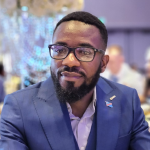
Bugondo (Blaise) Ntibonera
Congolese refugee, refugee resettlement supervisor at Lutheran Social Services
As all refugees who got resettled in the USA, at the USCIS interview in the refugee country, the immigration agents ask all refugees if they know someone in the USA - these people are called “USTie” - so they can resettle them close to that person so that person can help the refugee to adjust to their new life once they come to USA. That is how I came to Minnesota too because my brother’s lady knew someone who lives here in Minnesota when we were still in Africa.
From my home county to Minnesota has been a long journey. I lived in Uganda as a refugee for six years in a bad situation. Refugees didn’t have access to the health system, education, healthy living environment. Therefore, me being in Minnesota makes Minnesota my home because I now have full access to the health system and also, I live in a clean environment which is also safe. For me health is a state in life when I am physically and mentally feeling well. This state enables me to perform my jobs and play a big role in my life otherwise I wouldn’t be able to help other refugees who are coming after me.
My identity as a refugee doesn’t affect me. I am able to perform my duties while working with other people from different countries or even from here in America. We are all treated the same as others with love, respect and care.
Personally, I am a leader of a small group of singers. I try to encourage others to stay healthy at home and to make sure the food they eat is healthy. Because we heard that most of the health problem here in the USA are due to nutrition or diet.
To stay emotionally health, many people from Congo who are Christian trust and believe in God. They believe that there is powerful message in the music and in reading the bible. Also, by listening to poems and stories while in distress or depression.
Minnesotans love refugees and always stand on their side, that will make me think Minnesota can be called a “home of refugees”. Many refugee kids are studying in Minnesota which shows that in future many youth refugees will contribute more to Minnesota’s economy than our today’s contribution. I have one brother and seven nephews and nieces who are studying today in Minnesota with plans to be doctors, engineers, law enforcement agents, and case workers. It means the future of my family and I is being built here. I see myself in the future as a father of a heathy family and a great advocator for refugees. I am working hard to make this happen by staying positive in everything I do and always stick to the plan.
Number 1 life priority. My best life investments are in my health! Therefore it's very important and meaningful for me to maintain a healthy lifestyle.
Safety, community, perfect environment, support, and medical programs.
UACC creates opportunities, connections, and support. And also, our organization tries to treat people like they would be treated at home. A loving and caring environment is essential for mental and physical well-being.
Daily job, volunteering, and support.
A safe life, no wars, human kindness, respect, and a loving society.
To hear more about Iryna's story, watch Sharing Gratitude (YouTube).

